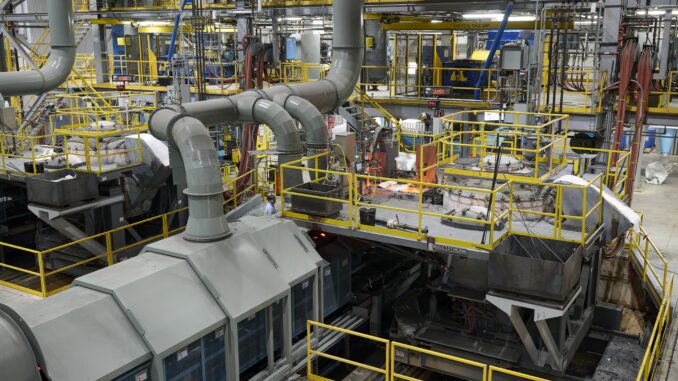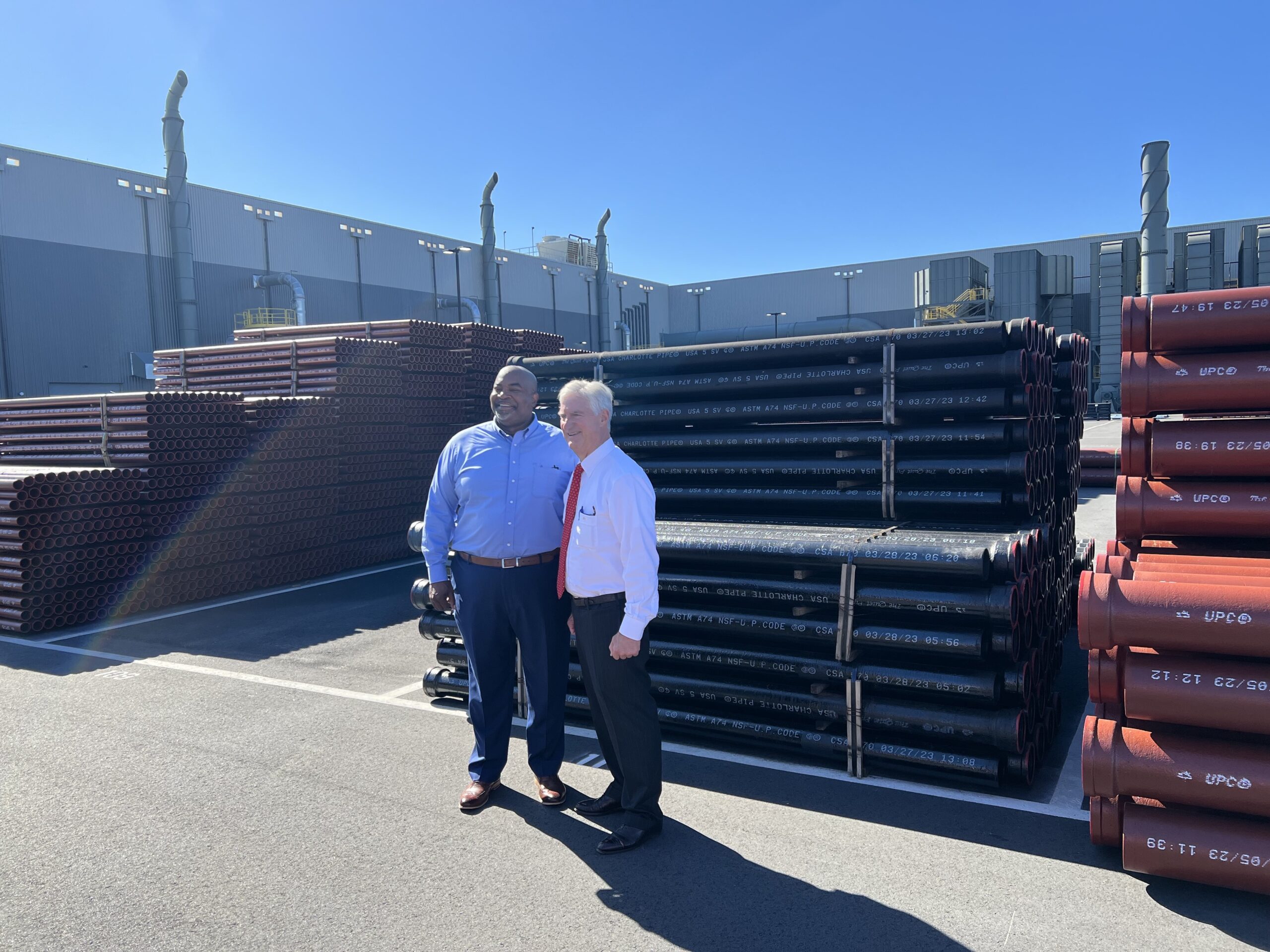

OAKBORO — Sunny skies on an unseasonably warm October day welcomed a host of leaders from Stanly County and beyond, as Charlotte Pipe and Foundry officially opened its new sprawling facility.
Rising behind acres of fields and trees just outside of downtown Oakboro, the sprawling $460 million facility is touted by the company as one of the most advanced manufacturing plants in the world.
In existence since 1901, the five-generation family business, which began on Clarkson St. in Charlotte by Willis Frank Dowd, made a move around 35 miles east with its new plant.
Charlotte Pipe employs 1,700 people directly, and the new Oakboro plant now takes over the work done at the Charlotte plant. Nationally, the company has operations in seven plants and recently acquired Neenah Enterprises, bringing an additional 1,000 employees to the company.
On July 13, 2020, Charlotte Pipe broke ground on the ambitious project. Over the course of three years, over 500 workers helped build the plant, boosting the local economy in Stanly County, according to Charlotte Pipe’s Roddey Dowd, the vice chairman of the board.
“Over three years, the project delivered a significant and much-needed boost to the local economy during COVID-19 and beyond, said Dowd to a crowd of over 100 in attendance. “The Oakboro plant will usher in a new era of growth and industry leadership For Charlotte Pipe. This is a generational project, and the relocation – the expansion of our legacy Foundry – is a strategic move to improve our processes and offerings in ways that will allow the company to continue to serve the plumbing industry – our associates in this community – for the next 100 years.”
Building a new manufacturing plant isn’t easy in modern times, something Charlotte Pipe took into account when making the move.
The company spent $58 million in environmental controls at the plant as part of a commitment to sustainability. Included in that spending is a 70,000-megawatt substation built on-site to power the plant, switching from a fossil-fuel melt system to electric melt, which will considerably reduce emissions in comparison to its Charlotte facility, operating 30 baghouses and four Regenerative Thermal Oxidizers (RTOs) to collect particulates and emissions, and continuing its recycling of scrap iron and steel to the tune of 150,000 tons per year.
Charlotte Pipe also built its own rail spur line to connect the plant to other rail access points to allow it to move recycled material to and from the Eastern Seaboard and the Midwest.
“This time-tested commitment to building lasting relationships has been fundamental to our growth and success,” said the company’s CEO, Hooper Hardison. “Our mission statement and statement of values guide us affirming our commitment to treat all associates with dignity and respect, to produce the highest quality products we can in the safest and cleanest plants around to provide job security, to be good environmental citizens, and to give back to the communities in which we live and work.

The work inside the facility has been operational since August. As part of the opening of the facility, tours were given to media members and the many elected officials in attendance, including Lt. Gov. Mark Robinson and several state senators fresh off concluding legislative business of the year. Also in attendance were Charlotte Mayor Vi Lyles and nearly every elected official from Stanly County.
The plant features 11.5 acres under one roof in sections from the pipe melt process to sandblasting. One of Roddey Dowd’s pieces of advice to those taking the tour was to “keep your head on a swivel,” as at various points, those on the tour and unfamiliar with the inner workings of the company would be just feet from flames, sparks and iron that can reach temperatures of 2,000 degrees.
The company makes an array of products for plumbing, from large pipes for commercial use to fittings as small as 1/2 inch.
Throughout the facility, those giving the tours – including T.J. Costello, the company’s Vice President of operations – knew many employees by name. According to Costello, approximately 60% of those working at the Oakboro plant live in Stanly County.
With the opening of a new plant, there is also the question of what happens to the former one: 55 acres that sits just off Interstate 277 on an outer corner of uptown Charlotte.
Brad Muller, the company’s vice president of corporate communications, told North State Journal that in the short-term, the company is focused on closing out operations, but the long-term future is still to be determined.
“Long-term, we have CBRE marketing the facility but nothing imminent,” said Muller.
Among the considerations are the current rail yard and freeway, he added. In past years, the site was touted as a potential replacement for Bank of America Stadium, which sits close by, although indications are a ‘significant’ renovation appears likely in coming years.
Moving to Stanly County provides Charlotte Pipe with what company executives call a more efficient layout of the plant and equipment, and flexibility to expand and meet future needs. The company intends to be a leader in its industry for another 100 years.
“We hope our investment in this new state-of-the-art operation demonstrates our commitment to our associates, to the future of Charlotte Pipe and our industry and our confidence in the future of American manufacturing,” Hardison added.



